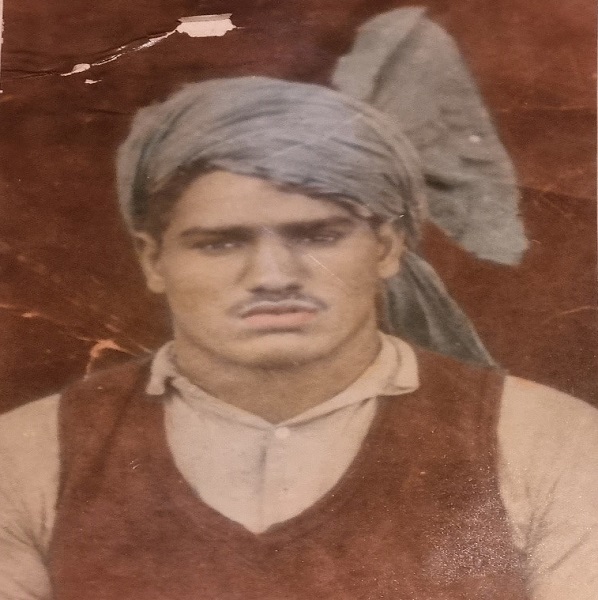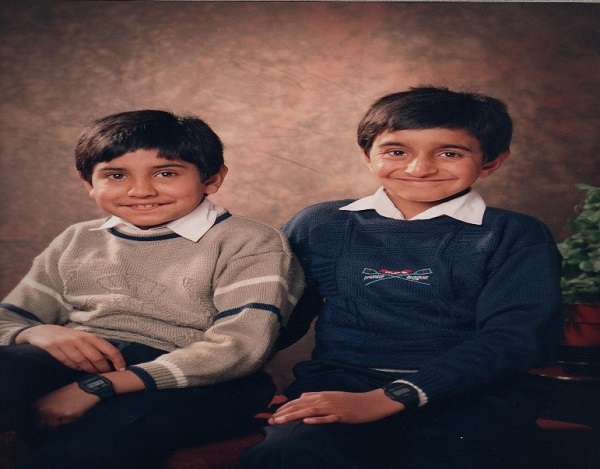My Father: A story of a textile worker in Blackburn

Mohammed Malik, aged 18 years
It is difficult for me to imagine how harsh or hard life was for my father, (Mohammed Malik), when he first came to England in the early 1960s, eventually moving to Blackburn in 1973. As a child you adapt to your new surroundings much more quickly than the adults. Although he briefly talked about how it was for him, as a lodger, sharing a house with almost a dozen other men when he first landed in Oxford. He told me how they had to sleep two to a bed, sometimes more and quite often as more new arrivals came, the more established residents slept on mattresses on the floor. All this in a house with just two bedrooms.
However, his journey to England, or ‘Inglaand’ as many Pakistanis called it, began as it did for so many migrants from the Indian sub-continent, due to the labour shortage following the Second World War. Britain was rebuilding after the combined efforts of many countries, including those from the Commonwealth, to defeat Nazi Germany in 1945.
My father’s journey started in 1962, when the village elders felt someone from the village needed to go to this land of plenty. He was chosen as one of the first from the village to travel thousands of miles to earn as much money as he could to help support his family and the village. As many villagers as possible gave what they could to help him with his journey. My father didn’t choose Oxford, it was chosen for him by the village elders as they knew someone there that would help him find a job. He very quickly found a job in a cement factory; the heavy work was ideally suited to his powerfully built body. He worked as much overtime as was available to boost his earnings, which were divided into three – the majority was sent to the village elders to pay back all those who contributed towards his travel there and upkeep, and to his family. What little he had left, he used for his lodgings and food.
Within three years, despite working every hour he could, he realised he was never going to make enough money to allow him to go back to his home village of Kala Gujran. His thoughts turned to his family, which he missed immensely, and his thoughts turned to call them over to join him here. In 1965 my mother – Siran Bi, my adopted brother – Mohammed Zaman and I joined him.
Siran Bi
Within two years we moved to Bradford in West Yorkshire, where my mother wanted to support her younger sister who had been diagnosed with cancer. The immediate and extended family units were closely knit within the Pakistani community.
In Bradford, my father found work in a textile mill, he was very adaptable and had a great work ethic. Despite not being fluent in English, he was never unemployed and worked every single day until he retired. Unfortunately, the textile industry started to decline and slowly shut down in Bradford, but the cotton mills in Lancashire were still going strong, so, we moved to Blackburn in 1973.
Quarry, Street, Blackburn. Photograph taken by Adrian Lewis
My father found work at Moss Bridge Mill, in Darwen and bought a house on Quarry Street, (no 41), near Larkhill Health centre, within easy reach of the town centre, which was only a few hundred yards away.
My father never talked about how difficult work was or if he had any problems at work, quite frankly, I don’t ever remember him moaning about any aspect of his life, he was certainly used to hard work and felt he owed so much to so many people and that he had to work hard to pay for their faith in him.
In the 1970s, Blackburn was a very different place to what it is now. There were lots of tensions about the immigrants from the Indian sub-continent and the more recent African Asians, including those from Uganda, where Idi Amin was forcing them out.
In 1973, the National Front was founded by John Kingsley Read, who became its chairman, the following year. This led to intimidation, verbal and physical attacks on the Asian community. Most of the Asians workers working in the textile mills in Blackburn and Darwen dreaded the afternoon shifts, (2pm to 10pm). Most were attacked by the ‘skin-head’ thugs when they went to work or when they finished their shift, spurred on by the Read’s speeches about the immigrants.
Fortunately, by 1976, I was driving and owned my first car, a Hillman Avenger, which allowed me to pick him and two or three of his friends from work, avoiding them being attacked.
It was the most terrifying period of all our lives as it led to not only the textile workers being attacked, but many women and children too, even in schools, simply because of the colour of or skin and the hateful narrative being pushed by Read and his party.
Despite this, my father always wanted me to concentrate on the many different opportunities England had to offer us and how much better life was for us.
 Bashir and Mehboob, much loved grandsons
Bashir and Mehboob, much loved grandsons
He taught me to see life in a very different way and I will always remember his words as he told me …
“Your life is meaningless, if it is not of service to others”
After retirement he continued to provide advice and support to many who came to seek his counsel.
His words of being a service to others continue to help me to strive to do just that.
Text and images by kind permission of Mahmood Ahmed, July 2022
'A Conversation with local author Mahmood Ahmed' will take place at Blackburn Central Library, 2pm, Thursday 22nd September, 2022.
FREE entry by Ticket which needs to be booked in advance
Please either email: library@blackburn.gov.uk or telephone 01254 661221

